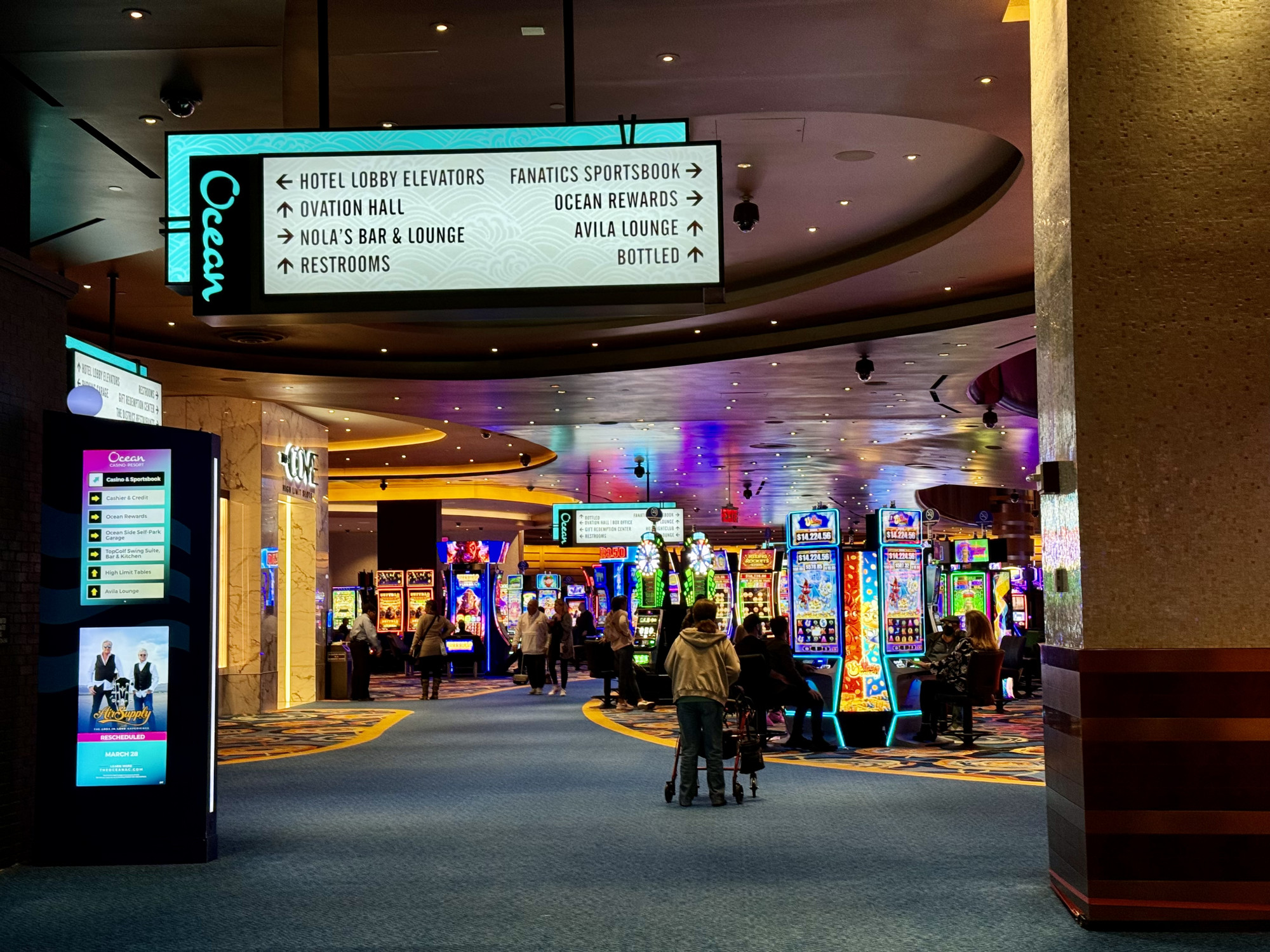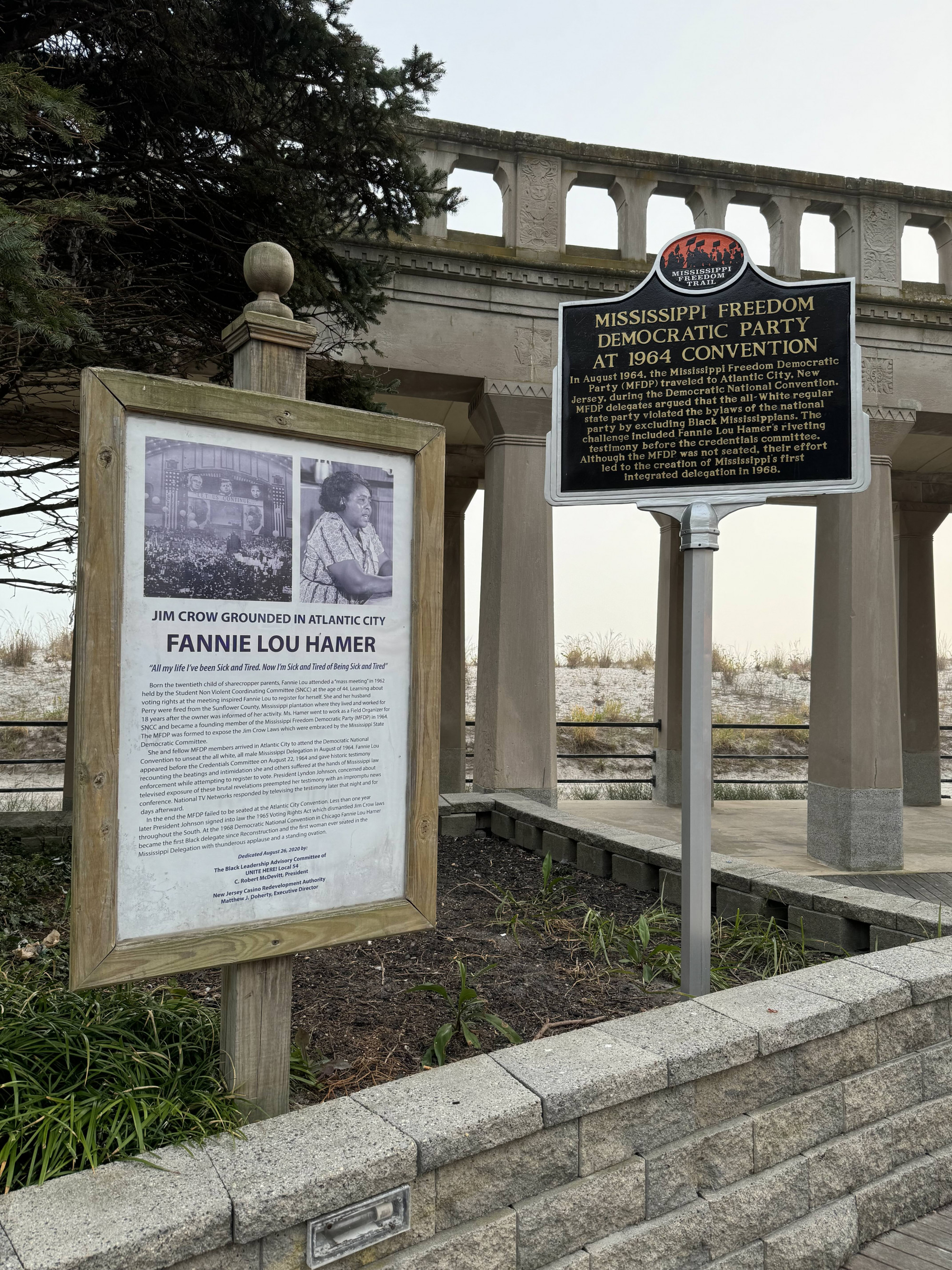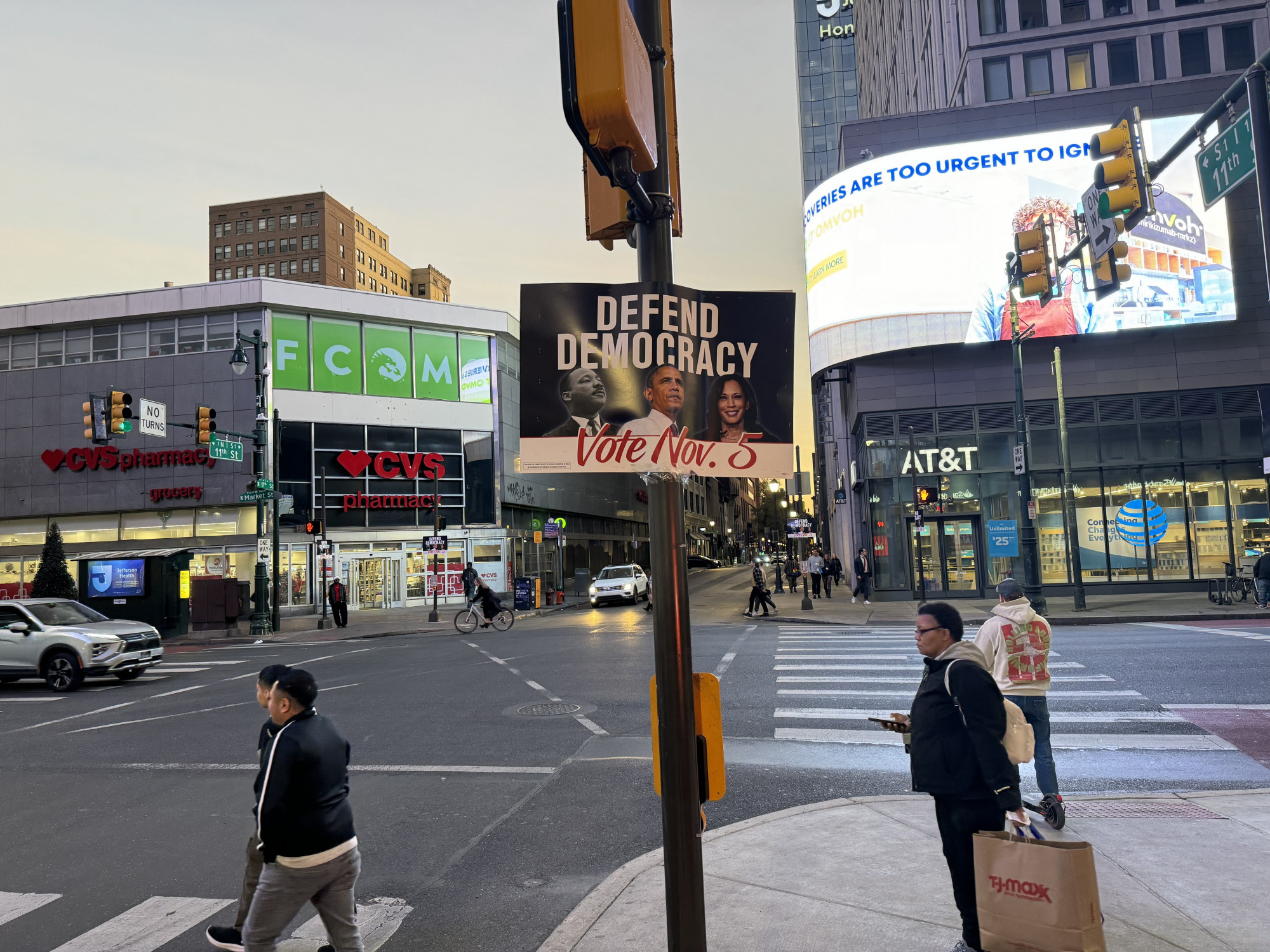
Courtesy of author
Gambling on the Election in Atlantic City
Fear and loathing in the shadow of Trump’s Taj Mahal
By R.J. Morgan
If you are suffering from election fatigue, may I recommend a quick trip to Atlantic City?
Last week I was in Philadelphia for the Journalism Education Association/National Scholastic Press Association’s Fall High School Journalism Convention. Several thousand student reporters from across the country were heading to town to hear from professional speakers, compete against each other in on-site contests, and generally engage with some of the core values of our democracy.
Looming was the giant hurdle of Election Night, where the country was being asked to decide between a Democratic nominee who had not appeared on a primary ballot and a Republican nominee who had yet to definitively concede losing the last election four years ago.
When I arrived on Sunday evening, ahead of the election, Philadelphia was a town on the march. Signs on every street corner encouraged citizens to “Defend Democracy: Vote Nov. 5,” with photos of three Black leaders: Martin Luther King, Jr., Barack Obama, and this year’s Democratic nominee, Vice President Kamala Harris.
Pennsylvania was the undisputed prize in this cycle’s crop of crucial swing states. Harris’s final campaign rally was scheduled for the following evening on the “Rocky Steps” in front of the Philadelphia Art Museum. Across the state, Republican nominee and former president Donald J. Trump made his election eve pitch to voters in Pittsburgh.
A friend and I—himself a high school journalism adviser from Kentucky; we’ll call him Larry—had decided to fly in early to take in the scene. We registered for the Harris event just to see the spectacle, and it ended up attracting a standing-room-only crowd in the tens of thousands. Lady Gaga was there. Oprah was there.
But we weren’t there. By the time Monday rolled around, we’d decided on a different adventure entirely. We were an hour away, holed up at the Ocean Casino Resort, by far the most modern looking property along the aging Atlantic City Boardwalk.
Atlantic City gets a deservedly bad rap as a low-rent paradise. It’s a city where violence and corruption (and the tremendous wealth that went with it) dominated during the golden days of Prohibition.
It’s also the city where Donald Trump made his first major splash outside of New York City as a real estate developer, opening two large casino properties along—and one nearby—the famous Boardwalk in the late 1980s and early 1990s.
And it’s the same city where, in 1964, Fannie Lou Hamer and a company of other insurgent patriots from my home state of Mississippi protested the state’s all-white delegation at the Democratic National Convention. They lost the challenge, but changed the Democratic coalition in the process. Once the party of hardline Southern segregationists, the post-Atlantic City Democratic Party would welcome and depend on minority voters as key members of its voting bloc and seat Hamer herself at the 1968 convention.
Fifteen election cycles later, we were in Atlantic City on the night Donald Trump eviscerated that coalition, bringing large swaths of Black and Hispanic voters over to his bright red MAGA tent en route to a reelection blowout.

Courtesy of author
The first thing we needed were apps. Gambling apps.
Thanks to a ruling in federal district court back in September, the 2024 election was the first in more than a century where citizens could legally bet on the outcomes of various races up and down the ballot, including who would become our next president.
These bets are set up as prediction markets with event contracts, where those with money to burn can wager on future events in a binary yes-no fashion:
Will Donald Trump win the 2024 election? Bet yes or bet no.
The Commodity Futures Trading Commission, the regulatory agency charged with refereeing such madness, has already appealed the ruling, so this whole operation might still become illegal again soon. But not before America had a chance to gorge itself on one Election Night bonanza.
I grabbed a few straightforward contracts on the Robinhood app, then loaded $100 onto the Kalshi app and started exploring my options. As regular gamblers already know, these types of prop bets can spiral out into oblivion. Here is a short list of things I was able to wager on:
Who will win the 2024 Presidential Election?
Will the Sun Belt swing states vote together?
Which party will win the Senate?
Will the candidate who wins Pennsylvania win the presidential election?
Wicked’s Rotten Tomatoes score?
Billie Eilish has a No. 1 album before 2026?
I placed a series of $5 bets on most of the above, plus the outcomes of a few key presidential battleground states and interesting senate races. I tried to spread the bets around in a bipartisan fashion, but as the underdog, Harris bets usually appeared a much better bargain.
Larry, hopped-up on craft beer and curated talking points, was confident in Harris’s prospects. Confident in the so-called Blue Wall of Pennsylvania, Michigan, and Wisconsin. I showed him what kind of odds I was getting—Harris bets had an average payout of 60 cents on the dollar versus 40 cents for the same bet on Trump—and he was enthusiastic about my betting on Team Blue.
“Yeah, it sucks,” he said. “But I get it. Your guy starts winning and my guy starts losing, now we might have a problem with each other.”
After a morning soak in the Ocean Casino Resort’s poolside hot tub, overlooking the foggy Atlantic coast line, we set out in search of voters. Or, if nothing else, any visible sign that an election might be happening.
We found very little of any of it.
One boardwalk souvenir shop had a small number of Harris-Walz and Trump-Vance T-shirts, but they were not prominently displayed. They sat next to other offensive and clichéd garments, like one that said, “I’m not gay, but $20 is $20.”
We took a rickshaw down to Jimmy Buffett’s Landshark Bar & Grill, which was practically empty. Atlantic City is a summer town and November is clearly the off-season. We took a golf cart further down the boardwalk and ended up riding with a couple of older women from Florida.
“You know the election is today,” one said to the other.
“Oh yeah,” she replied.
We got off at the former Atlantic City Convention Hall, where the Democratic National Convention had been held in 1964, and took in the plaques dedicated to Hamer, John F. Kennedy, and others.
At Dock’s Oyster House, a legendary establishment a few blocks off the boardwalk, we found no signs of election enthusiasm but did enjoy plenty of Cape May Salt oysters.
Several cocktails in at this point, we mirandered—“to meander around in such a state of inebriation as to invite the reading of Miranda Rights if noticed by local law enforcement”—to the Tropicana casino and, since election gambling is a new, niche market and casinos aren’t yet set up for it, posted up at a sports bar and opened our apps. I asked the bartender if we could turn one of the nearly 27 televisions in the joint over to a news station.
“Can’t do it,” he said. “They won’t let me.”
I pushed back. You’re not allowed to put a television on the election returns? In America?
“Yeah, it sucks,” he said. “But I get it. Your guy starts winning and my guy starts losing, now we might have a problem with each other.”
I didn’t get it.
Forty-five minutes into a brutal losing streak, an older female dealer leaned over to her male counterpart and said, “You’d never even know it was election day in here, would you?”
Defeated, we headed northeast toward the greatest prize of the night: the Hard Rock Hotel & Casino Atlantic City, formerly known as the Trump Taj Mahal.
The Taj opened in 1990 to serious fanfare. Built at a cost of almost $1 billion and billed as the “eighth wonder of the world,” it and its sister properties further cemented Donald Trump as a serious, splashy real estate developer in the minds of the American public. For a time, he was Atlantic City royalty. His properties hosted Mike Tyson prize fights, bombastic press conferences, concerts by A-list stars, even WrestleMania.
Atlantic City was also one of Trump’s greatest public failures. The Taj project was bloated and badly overleveraged before it ever opened. A year later, it went into a prepackaged bankruptcy, and Trump lost about half of his financial interest. His other properties met similar fates.
But Trump himself was able to escape financial ruin. He diluted his losses through multiple bankruptcies and corporate restructurings, losing equity on each transaction, but never taking the full financial brunt of his many miscalculations. By the mid-2000s, he had pulled out of Atlantic City entirely, his image and ego battered but not entirely broken.
He would perform similar magic tricks decades later as the leader of the Free World. Twice impeached, but never removed from office. Beaten by Joe Biden in 2020, but never definitively conceding the election. Convicted of 34 felonies in 2024, but still his party’s nominee.
There’s an old poker adage that says all a rounder needs is “a chip and a chair” to stage a comeback.
Inside the Hard Rock, there were few if any signs remaining of the property’s former owner. Gone were the Taj’s gaudy architecture and circular spires. Replacing them was a normal looking Hard Rock property. Expansive but forgettable.
After contributing to the local economy via the roulette and blackjack tables, I headed for the pile of people shooting craps across the mostly-empty casino floor. Surely one of these fine fools would give me an opening for some election talk.
Forty-five minutes into a brutal losing streak, an older female dealer leaned over to her male counterpart and said, “You’d never even know it was election day in here, would you?”
Shortly thereafter, the Associated Press called North Carolina, the first swing state off the board, for Donald Trump.

Courtesy of author
In my forty-eight hours in New Jersey, she was the only person I met who seemed to have an opinion one way or the other.
Back at the Ocean, we ended the night at the Fanatics Sportsbook bar. It was an open atrium area in the middle of the gambling hall with large, swooping stadium screens everywhere. At the center was an oval bar, where players could watch their sports bets play out on the video feeds surrounding them while drinking away the sorrow of their losses and playing video poker.
Again, not a single screen was devoted to the election.
I sat next to a young woman named Bianca who turned out to be an escort taking a break between customers. She was a journalism major, of all things, enrolled at City University of New York. She lives in Brooklyn and comes down to Atlantic City to work a few nights every week because sex work in NYC has gotten too dangerous, she says.
I told her I was a journalism professor, and was there to gather reactions to the results of the election.
“I saw Trump was gonna win,” she said. “Not too happy about that.”
In my forty-eight hours in New Jersey, she was the only person I met who seemed to have an opinion one way or the other.
An hour later, Trump took the stage in Palm Beach, Florida, for his victory speech.
Dating back to his casino ventures in Atlantic City and even earlier, he has acted with brash and reckless abandon.
We woke up Wednesday morning and drove back to Philly. My $100 in election bets had yielded a negative return of $53, buoyed mostly by Republican wins. On the Kalshi app, Americans had bet more than $132 million on the outcome of the presidential race, $400 million across presidential, Senate, House, and some state races. The Robinhood app showed similar final numbers.
On the whole, betting apps proved to be more accurate in most cases than the much-maligned professional polling industry. Ask any gambler, even a rank amateur like myself, and they will tell you: Vegas always knows.
“The groundhog saw its shadow last night,” Larry said as we drove. “Now we’re in for four more years of winter, hopefully non-nuclear.”
The Republican Party will now control all three branches of the federal government for at least the next two years. A series of crises, foreign and domestic, currently rage like wildfires.
The Democratic Party has to decide whose interests it will serve going forward. The rural, working-class voters who have traditionally made up the party’s base no longer feel at home there. And neither do minorities, in increasingly significant numbers. In Michigan, Trump won a plurality of Muslim voters. In Texas, he won a majority of the Hispanic vote. Nationally, he picked up seven percentage points more of Black voters than he did in 2020. For Democrats, the coalition forged out of the 1964 convention is rapidly unbraiding.
And what of the man who would be king?
Donald Trump’s business acumen really boils down to two things: self-promotion and self-preservation. He is maybe the greatest of all time at those two things. Dating back to his casino ventures in Atlantic City and even earlier, he has acted with brash and reckless abandon. He refuses the advice of his advisers. He makes risky gambles and, just as frequently, loses them. But just when you’ve written him off, he rises from the grave. Like Lazarus, if Lazarus sold used cars.
He isn’t just America’s president. He is its mirror image.



